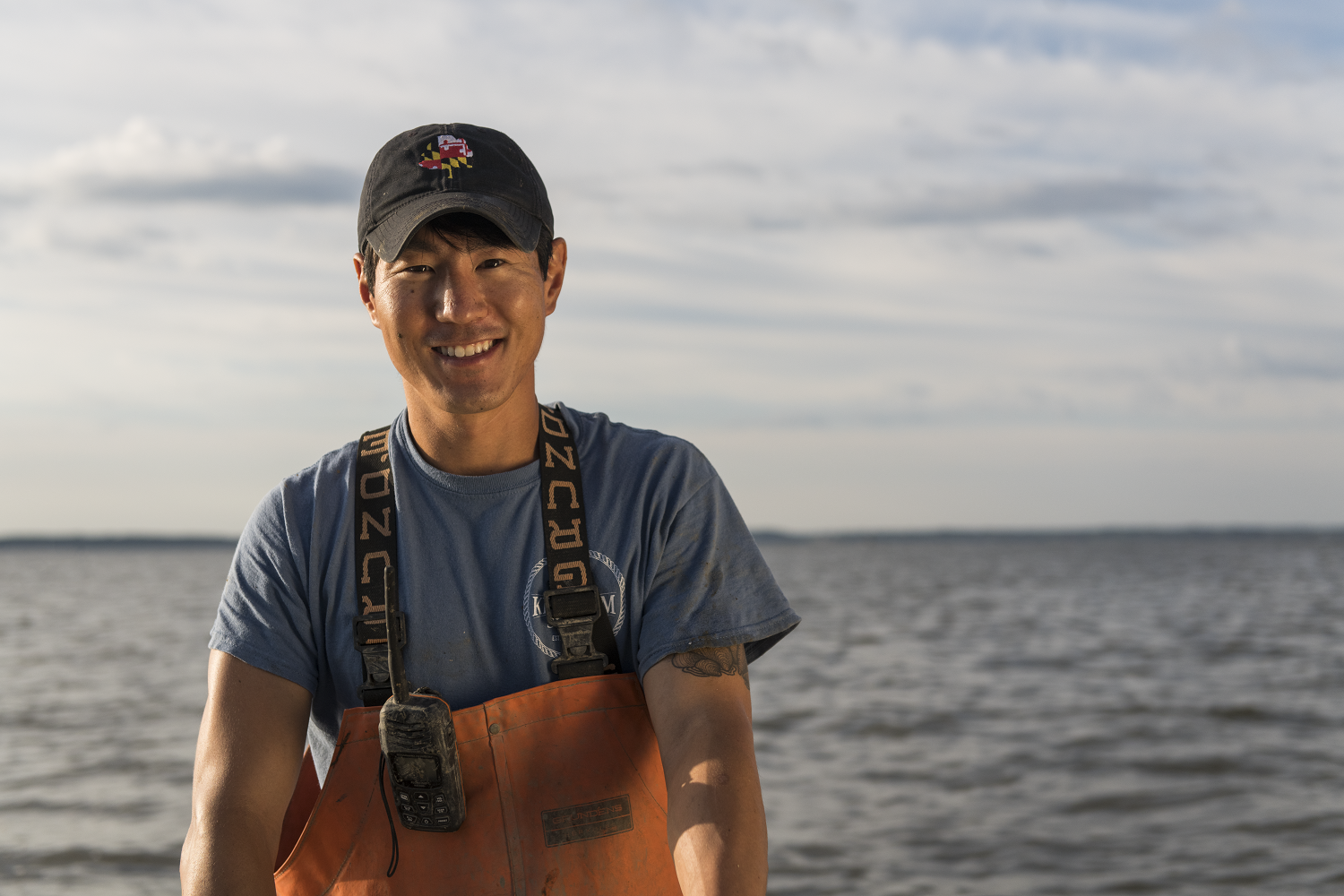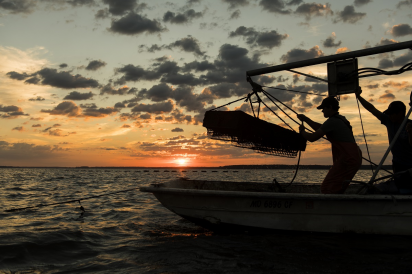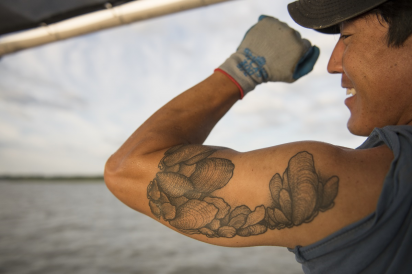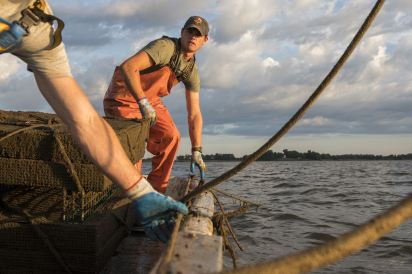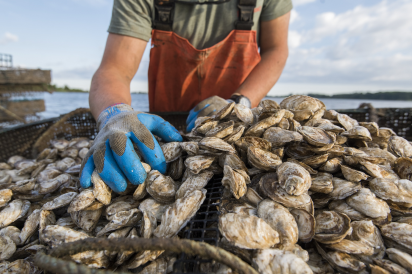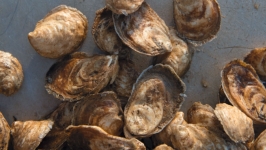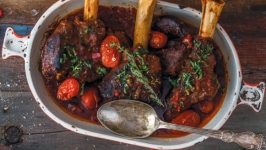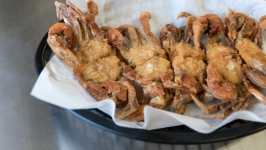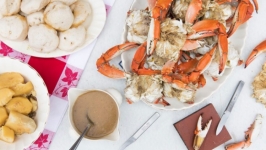Orchard Point Oysters: Small Farm, Mighty Determined
Walk into any raw bar today and it’s unmistakable—we are in a Chesapeake oyster renaissance. In less than a decade, we have gone from our “traditional” oyster culture— two varieties, Chincoteague or Chesapeake; all-you-can-eat quantities; only in the wintertime—to aquaculture, where scores of boutique brands are available year-round. Where once a ‘local’ oyster meant anywhere in the Bay wild oysters were plentiful, now each farm’s location can be precisely pinpointed, allowing consumers to select an oyster by the flavor profile unique to the lease where it was grown. And instead of platters of restaurant half-shells, shucked anonymously in the kitchen, we have raw bars where curated oysters are shucked in front of hungry, discerning consumers in a ritual as much about showmanship as it is freshness. No doubt about it, the contemporary Chesapeake is an oyster glutton’s paradise.
But this oyster sea change has had a radical impact, not only on our oyster consumption but also on the oyster industry. Over ten years, oyster farmers from all walks of life have joined watermen in the water business. Through their innovation, they have rapidly transformed how and where oysters are produced. As their numbers have grown, these former teachers, writers, accountants and doctors have also redefined the very definition of an oyster producer.
No one knows this better than oyster farmer and Kent County local Scott Budden. Establishing the first—and to date, the only— oyster farm for the fine dining market on the Chester River, Orchard Point Oysters, wasn’t just an uphill climb: it was an effort of Sisyphean proportions. Budden, an oyster lover who left a successful career in DC as a financial analyst and planner, saw transitioning to oyster farming as a way to have a life of social and environmental impact, in a place he loved—his hometown of Chestertown, Maryland.
“I felt kind of lost in the shuffle,” Budden says of his personal watershed moment. “Instead of waiting for a midlife crisis to roll around, I decided to just make a change.”
Change doesn’t come easy in the Chesapeake, and it certainly didn’t come easy for Budden, either. After serious research into the oyster aquaculture industry, it took him two arduous years to navigate the vagaries of the nascent Maryland oyster lease application process, which required approval from the state and the Army Corps of Engineers as well as a public comment period. Budden met intense local skepticism and resistance. First from local watermen who worried he’d limit their access to the river’s fisheries, and then from waterfront homeowners, who were concerned his lease would scare waterfowl away from their hunting blinds or lower their property value.
Budden was dismayed but determined. “I tried to channel all that negative energy into pushing through and getting it done,” he says, “Because I knew if it was an uphill battle to get the lease approved, it was going to be even more of an uphill battle to start the business and get it growing.” Despite the community’s misgivings, he ultimately persevered. In 2015, Budden planted his first crop of 330,000 oysters on his new lease in the Chester River—but it was just the beginning.
Since then, he’s experienced the kinds of challenges any land-based farmer might recognize: that ice or floods might ruin your crop, your tools break and need repairs you do yourself to keep costs down, new equipment is too pricey or unavailable so you create what you need, and good, consistent help is hard to find when the work is backbreaking and takes place, like the Postal Service, in snow, rain, heat, or (in this case) the gloom of pre-dawn. “Whatever you do on the water, no matter what it is, it’s going to be hard,” Budden says, “But my mentality always was, I’ve made it this far, I haven’t been beat yet, I’ve just got to keep going.” His by-the-bootstraps mindset saw him working full days on the lease, then driving oysters to restaurants in DC and Baltimore himself to drum up demand, or shucking hundreds of oysters like a house afire at events from Ryleigh’s Oysterfest in Baltimore or the Oyster Recovery Partnership’s Mermaid’s Kiss in Annapolis.
All that hustle has paid off in spades. In 2016 Budden planted 660,000 oysters, in 2017 one million, and this year he’s planted 3.5 to 4 million oysters. He’s selling his Orchard Point oysters to celebrity chefs like Woodberry Kitchen’s Spike Gjerde, Husk’s Sean Brock, Wolfgang Puck, and many other Michelin-starred and James Beard award winners. His team has grown to include two hardworking farmhands, Sean Corcoran and Washington College student Bo Flint, who show up often in Orchard Point’s lively social media accounts.
His oysters are thriving, and with a work ethic and dedication that Abraham Lincoln would admire, it’s no surprise that his business is too. Four years in and Orchard Point Oysters is now expanding to include a new lease with new partners in Eastern Bay, where Budden can finish his Chester River oysters in the higher salinity. He’s also tinkering with his gear—Budden’s considering switching from bottom cages to floats—as he continually thinks of ways to streamline and improve his product.
Clearly, there’s no such thing as resting on your laurels for Scott Budden. But in reflection, he says it was all worth it. “It’s been absolutely frustrating and challenging at times and it takes a toll on you physically, but I would absolutely do it again,” Budden says. “I learned so much along the way, not just oyster farming but fabrication and repair. Guys that work their whole lives on the water know that it’s all just part of focusing on their craft. And now it’s mine too.”
Orchard Point Oysters: 24179 Walnut Point Rd., Chestertown, Maryland, 443-480-0302


